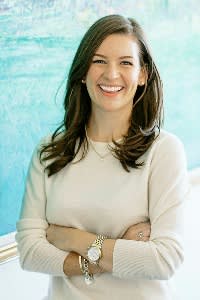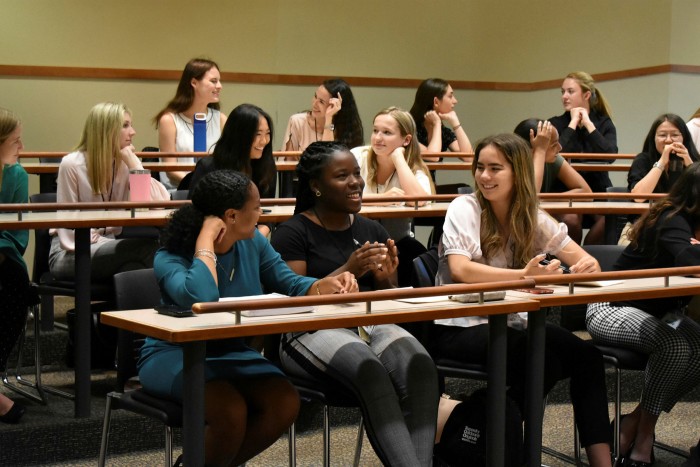Kathy Matsui’s new international venture cash fund drew headlines previous thirty day period for currently being the first of its type in Japan to aim on environmental, social and governance ideas.
But the information was also sizeable for a different explanation. Matsui, who remaining financial commitment bank Goldman Sachs in Japan previous calendar year and is recognised for coining the time period “womenomics”, is a female at the helm of an all-feminine management workforce — a rarity in the male-dominated finance sector.
Small business faculties are attempting to alter this. To raise the small selection of women in senior finance roles, some faculties are on a press to assist dismantle the limitations to their development. They are attempting a assortment of methods — ranging from new curriculum layout to on-campus and alumni networks.
For several, the first obstacle is to persuade youthful women that careers in this area are welcoming and gratifying. “A whole lot of it stems from misinformation about what the entire world of finance truly is,” suggests Haley Parrin, who recently graduated from UNC Kenan-Flagler Small business School. She was the first feminine president of the school’s Expenditure Banking Club, which will help MBA college students put together for doing the job in finance.

She argues that positions in the sector are typically mis-characterised as selection crunching when, in point, the perform calls for strategic pondering. Parrin labored in organization examination and consulting before setting up her MBA class.
“What goes on over and outside of [selection-crunching] is far far more essential than just getting the numbers suitable,” suggests Parrin, who will be becoming a member of financial commitment bank Morgan Stanley in July. “That talent established is anything a whole lot of women have to supply but don’t know how to utilize to the money expert services entire world.”
Katherine Jollon Colsher, chief govt of Ladies Who Invest, a non-earnings organisation doing the job to raise the selection of women in senior asset management roles, agrees. “It’s a occupation that is not typically understood,” she suggests. “People talk about currently being a law firm, a health care provider or a teacher — but less so about currently being a portfolio supervisor.”

But when perceptions are shifting, the strategy of male-only boardrooms and lone feminine analysts persists in the preferred creativeness, suggests Kathy Harvey, affiliate dean for diploma programmes at the University of Oxford’s Saïd Business School. “It usually takes several many years to alter lifestyle and anticipations.”
She argues that organization faculties, as educators of opportunity finance leaders, are very well placed to speed up a change in lifestyle and anticipations. Their function features providing youthful women a room to investigate their potential careers with “a feeling of assurance and a feeling that they definitely can go anywhere they want to”.
Jennifer Bethel, a finance professor at Babson College in the US, suggests faculties can also assist “normalise” the existence of women in finance. Some fifty for every cent of Babson’s finance professors are women, she provides. “Thirty many years in the past, you didn’t have women finance professors and now you have a whole lot of them,” she suggests.
Even a modest alter — she phone calls it a “one-inch deep” change — can make a difference. One instance she presents is a circumstance examine protagonist having a feminine title. “That’s a stage forward,” she suggests. “But then it is about finding [true scenarios on] corporations that are owned and operated by women.”
Small business faculties can also phone on feminine alumni doing the job in finance to convey other senior women in the sector into classes.
Saïd’s private fairness elective classes have experimented with to do just that, suggests Harvey. “[It] variations the environment in the home and the nature of anticipations.”
An uphill battle
In the United kingdom, women hold 17 for every cent of senior roles in the money expert services sector, a proportion that has barely transformed considering that 2005, in accordance to the Monetary Perform Authority, the industry regulator. In the US, in accordance to Morningstar investigation, at the end of 2019 just 14 for every cent of fund supervisors were women — a determine that experienced not transformed considering that 2000.
These steps show up to be paying off: the proportion of the school’s feminine graduates heading into finance roles rose from 37 for every cent in the class of 2018-2019 to forty seven for every cent in the class of 2019-2020.
Having said that, Bethel argues that elevating consciousness of finance as a promising vocation for women should commence when they are young adults still at university.
She cites the Monetary Wellness Method, a group company programme run by the Babson Finance Association. Its users — two-thirds of whom are women, she suggests — educate primary particular finance expertise at faculties in underprivileged communities.
A lot more stories from this report
“You have these wonderful women in entrance of these superior-university children,” suggests Bethel, who is also co-founder of the Babson Monetary Literacy Job. “Creating this chain is critical, so they can consider what [the finance sector] is,” she suggests.
Meanwhile, the rise of ESG-centered investing is serving to to catch the attention of and raise the selection of feminine finance executives.
Between 2015 and 2020, for instance, forty four for every cent of the senior ESG positions that Acre Resources, a specialist govt look for consultancy, served to fill went to women.
“Already women are connecting to sustainability — and now there is a finance lens with that,” suggests Bethel.
